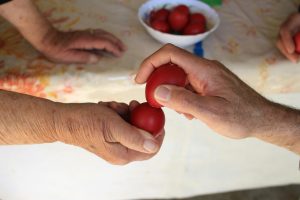
Britain’s many traditions and customs reflect the country’s rich cultural history. These celebrations are almost all tied to the agricultural calendar, local folklore, religious festivals, historical events, or communal identity. However, the relatively recent past has seen Britain undergo major technological advances, rapid urbanisation and mass immigration. These developments have fuelled a tremendous shift in Britain’s social norms. As a result, once well-supported customs and traditions are increasingly being forgotten.
Here’s a brief account of the once-popular tradition of pace eggs and egg dumping:
Easter and ‘Pace Eggs’
Eggs, an ancient symbol of new life and rebirth, have long been associated with Easter. In England, decorating eggs for Easter is a tradition that dates back to at least the 13th century. The decoration could be done either during or after the boiling process. It was once popular to wrap the eggs in onion skins, which produced a motley golden-brown coloured shell. However, other dying substances such as beetroot, spinach and coffee were also used.
More recently, it has become popular to paint the eggs rather than dye them. Once the eggs have been decorated they are then usually referred to as ‘pace eggs’. The term “pace” is thought to be derived from either the French word ‘Pâques’ or the Latin word ‘Pasha’, which both mean Easter.
Egg Dumping

Photo credit: Public Domain – Creative Commons
Egg dumping is a simple game traditionally played at Easter and is especially popular in the north of England. It is thought that Britain’s egg-dumping tradition may date back to as early as Anglo-Saxon times. The game involves two participants tapping the ends of hard-boiled ‘pace’ eggs. Egg knocking, egg dunking, egg tapping and egg jarping are among the many other names given to egg dumping.
The first player holds a hard-boiled egg and proceeds to tap the end of his opponent’s egg. The object of the game is to break the egg of your adversary by ‘dumping’ it, without breaking your own egg. It is usual to toss a coin to determine who holds the top (the dumper) and bottom (holder) positions. If neither egg happens to break on the first ‘dump’, players swap roles and the process is repeated. The person whose egg remains intact after the dumping is declared the winner. It’s customary for the loser to immediately eat their egg after being beaten.
Family members and friends gathering at Easter would often participate in egg-dumping competitions. These would be held on a knock-out basis with winners progressing through the rounds until a ‘champion egg’ was declared. Much larger egg-dumping competitions were commonly held in pubs and social clubs, most usually on Easter Sunday. The winners of these competitions could normally expect to collect a pot of money or prizes.
Apart from Britain, the tradition of egg-dumping is common in much of the Christian world, including many European countries, Australia, and the USA. A common theme across all of these areas is that the popularity of the age-old tradition of egg dumping appears to be in steady decline.
Header Photo Credit: CC By 2.0 Deed





